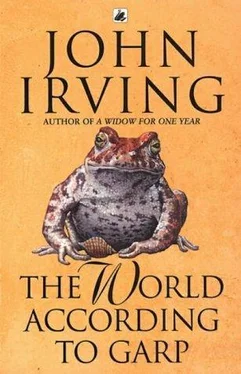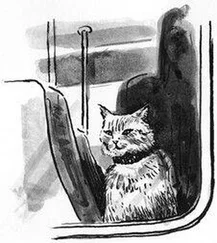And where did he get this idea of wanting to be the best?
Helen wrote him that he should go to Europe, and Garp discussed this idea with Jenny.
To his surprise, Jenny had never thought he would go to college; she did not accept that this was what prep schools were for . “If the Steering School is supposed to give everyone such a first-rate education,” Jenny said, “what on earth do you need more education for? I mean, if you've been paying attention, now you're educated. Right?” Garp didn't feel educated but he said he supposed he was. He thought he had been paying attention. As for Europe, Jenny was interested. “Well, I'd certainly like to try that,” she said. “It beats staying here.”
It was then that Garp realized his mother meant to stay with him.
“I'll find out the best place for a writer to go in Europe,” Jenny said to him. “I was thinking of writing something myself.”
Garp felt so awful he went to bed. When he got up, he wrote Helen that he was doomed to be followed by his mother the rest of his life. “How can I write,” he wrote to Helen, “with my mom looking over my sboulder?” Helen had no answers for that one; she said she would mention the problem to her father, and maybe Ernie would give Jenny some advice. Ernie Holm liked Jenny; he occasionally took her to a movie. Jenny had even become something of a wrestling fan, and although there couldn't have been anything more than friendship between them, Ernie was very sensitive to the unwed mother story—he had heard and accepted Jenny's version as all he needed to know, and he defended Jenny rather fiercely to those in the Steering community who suggested they were curious to know more.
But Jenny took her advice on cultural matters from Tinch. She asked him where a boy and his mother could go in Europe—which was the most artistic climate, the best place to write. Mr. Tinch had last been to Europe in 1913. He had stayed only for the summer. He had gone to England first, where there were several living Tinches, his British ancestry, but his old family frightened him by asking him for money—they asked for so much, and so rudely, that Tinch quickly fled to the Continent. But people were rude to him in France, and loud to him in Germany. He had a nervous stomach and was afraid of Italian cooking, so Tinch had gone to Austria. “In Vienna,” Tinch told Jenny, “I found the real Europe. It was c-c-contemplative and artistic,” Tinch said. “You could sense the sadness and the g-g-grandness.”
A year later, World War I began. In 1918 the Spanish grippe would kill many of the Viennese who had survived the war. The flu would kill old Klimt, and it would kill young Schiele and Schiele's young wife. Forty percent of the remaining male population would not survive World War II. The Vienna that Tinch would send Jenny and Garp to was a city whose life was over. Its tiredness could still be mistaken for a c-c-contemplative nature, but Vienna was hard-put to show much g-g-grandness anymore. Among the half-truths of Tinch, Jenny and Garp would still sense the sadness. “And any place can be artistic,” Garp later wrote, “if there's an artist working there.”
“Vienna?” Garp said to Jenny. He said it in the way he had said “Wrestling?” to her, over three years ago, lying on his sickbed and doubtful of her ability to pick out a sport for him. But he remembered she had been right then, and he knew nothing about Europe, and very little about any place else. Garp had taken three years of German at Steering, so there was some help, and Jenny (who was not good with languages) had read a book about the strange bedfellows of Austrian history: Maria Theresa and fascism. From Empire to Anschluss! was the name of the book. Garp had seen it in the bathroom, for years, but now no one could find it. Perhaps it was lost to the whirlpool bath.
“The last person I saw with it was Ulfelder,” Jenny told Garp.
“Ulfelder graduated three years ago, Mom,” Garp reminded her.
When Jenny told Dean Bodger that she would be leaving, Bodger said that Steering would miss her and would always be glad to have her back. Jenny did not want to be impolite, but she mumbled that one could be a nurse almost anywhere, she supposed; she did not know, of course, that she would never be a nurse again. Bodger was puzzled by Garp's not going to college. In the dean's opinion, Garp had not been a disciplinary problem at Steering since he had survived the roof of the infirmary annex at the age of five, and Bodger's fondness for the role he played in that rescue had always given him a fondness for Garp. Also, Dean Bodger was a wrestling fan, and one of Jenny's few admirers. But Bodger accepted that the boy seemed convinced by “the writing business,” as Bodger called it. Jenny did not tell Bodger, of course, that she planned to do some writing of her own.
This part of the plan made Garp the most uncomfortable, but be did not even say a word of it to Helen. Everything was happening very fast and Garp could express his apprehension only to his wrestling coach, Ernie Holm.
“Your mom knows what she's doing, I'm sure,” Ernie told him. “You just be sure about you .”
Even old Tinch was full of optimism for the plan. “It's a little ec-ec-eccentric,” Tinch told Garp, “but many good ideas are.” Years later Garp would recall that Tinch's endearing stutter was like a message to Tinch from Tinch's body. Garp wrote that Tinch's body was trying to tell Tinch that he was going to f-f-freeze to death one day.
Jenny was saying that they would leave shortly after graduation, but Garp had hoped to stay around Steering for the summer. “What on earth for?” Jenny asked him.
For Helen, he wanted to tell her, but he had no stories good enough for Helen; he had already said so. There was nothing to do but go away and write them. And he could never expect Jenny to stay another summer in Steering so that he could keep his appointment at the cannons with Cushie Percy; perhaps that was not meant to be. Still, he was hopeful that he could connect with Cushie on graduation weekend.
For Garp's graduation, it rained. The rain washed over the soggy Steering campus in sheets; the storm sewers bogged and the out-of-state cars plowed through the streets like yachts in a squall. The women looked helpless in their summer dresses; the loading of station wagons was hurried and miserable. A great crimson tent was erected in front of the Miles Seabrook Gymnasium and Field House, and the diplomas were handed out in this stale circus air; the speeches were lost in the rain beating the crimson canvas overhead.
Nobody stayed around. The big boats left town. Helen had not come because Talbot had its graduation the following weekend and she was still taking exams. Cushie Percy had been in attendance at the disappointing ceremony, Garp was sure; but he had not seen her. He knew she would be with her ridiculous family and Garp was wise to keep a safe distance from Fat Stew—an outraged father was still a father, after all, even if Cushman Percy's honor had long ago been lost.
When the late-aftemoon sun came out, it hardly mattered. Steering was steamy and the ground—from Seabrook Stadium to the cannons—would be sodden for days. Garp imagined the deep ruts of water that he knew would be coursing through the soft grass at the cannons; even the Steering River would be swollen. The cannons themselves would be overflowing; the barrels were tilted up, and they filled with water every time it rained. In such weather, the cannons dribbled streams of broken glass and left slick puddles of old condoms on the stained concrete. There would be no enticing Cushie to the cannons this weekend, Garp knew.
But the three-pack of prophylactics crackled in his pocket like a tiny, dry fire of hope.
Читать дальше












